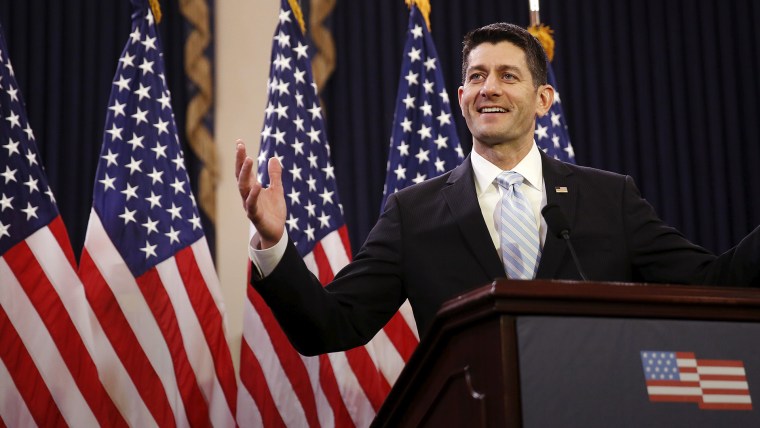There are three Republican presidential candidates left in the race, and chances are, one of them will be the party's nominee. On "Fox News Sunday" yesterday, Chris Wallace asked RNC Chairman Reince Priebus the question that's on the minds of many: Isn't it possible, at a contested convention, that the nomination could go to someone who isn't already a candidate?
Priebus described such as a scenario as an "extreme hypothetical," which he considers "highly unlikely." The Republican leader twice said it's "possible" for a non-candidate to end up as the nominee, but Priebus reiterated his belief that the Republican ticket will be led by "one of the three people [currently] running."
And yet, some in Priebus' party can't seem to let go of their dream. Politico reported this morning there are still "top" Republican insiders talking up the idea of nominating House Speaker Paul Ryan (R-Wis.).
On the eve of the Wisconsin primaries, top Republicans are becoming increasingly vocal about their long-held belief that Speaker Paul Ryan will wind up as the nominee, perhaps on the fourth ballot at a chaotic Cleveland convention. One of the nation's best-wired Republicans, with an enviable prediction record for this cycle, sees a 60 percent chance of a convention deadlock and a 90 percent chance that delegates turn to Ryan -- ergo, a 54 percent chance that Ryan, who'll start the third week of July as chairman of the Republican National Convention, will end it as the nominee.
The piece, from Politico's Mike Allen, added that the Wisconsin congressman is "more calculating and ambitious than he lets on." It added that Ryan "is running the same playbook he did to become speaker: saying he doesn't want it, that it won't happen. In both cases, the maximum leverage is to not want it -- and to be begged to do it."
The Speaker happens to be in Israel right now, but he called into Hugh Hewitt's conservative radio show this morning to once again he rejects the speculation. "I think you need to run for president in order to be president," Ryan said. "I'm not running for president, so, period. End of story."
Except, it's probably not the end of the story.
The Republicans and pundits keeping these embers burning have been quick to note, accurately, that Paul Ryan made similar comments after John Boehner's retirement, saying he wouldn't be a candidate for Speaker. The Wisconsin Republican, we now know, can be talked into accepting great power when it's offered to him on a platter -- which means the speculation will continue, probably until the convention itself.
But so long as the chatter continues, let's keep a few relevant details in mind. The first is the simple fact that if Republicans hold 50+ nominating contests over a six-month period, and then nominate someone who did not run for president -- and has said repeatedly that he does not want to be president -- the prospect of party-wide chaos shouldn't be dismissed too quickly.
Second, the assumption that Paul Ryan represents electoral magic for the GOP continues to be wrong. The Speaker was on the Republican ticket four years ago -- when he failed to win his home state -- and recent polling suggests the American mainstream doesn't share the Beltway's affection for the GOP House leader.
Finally, let's say for the sake of conversation that all of the obvious hurdles simply disappear. Let's imagine convention delegates were willing to embrace Ryan without controversy; the Speaker decided he wouldn't mind being president after all; the party wouldn't fracture; and polls turned in his favor. Even then, the idea would be dubious on the merits: The Republican Party would find itself in late July with a presidential nominee who has no campaign infrastructure, no platform, no stump speech, no staff, and no money.
I realize, of course, that the Beltway media would be quick to sing Ryan's praises and present him as a conquering hero, but pundits' praise does not an election win. For proof, ask President Rubio whether being a media darling is enough to propel a candidate to victory.
